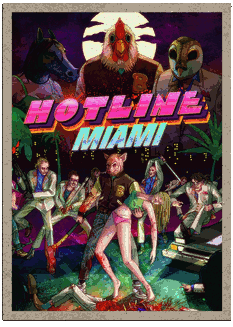
Play is important. Play, in that there is a space with rules and systems, where those rules and systems and the consequences thereof only matter within that space, is something foundational to humans, broader than we sometimes think. Our lives are big interconnected messes, and there is no true disentangling of the things we feel and live in our day to day lives with the games we play, but the rules of play itself are that we set something aside. That we see a boundary, and at least pretend that the play is apart from all of us.
Of course it isn’t. Play gives us catharsis, it gives us emotional insight. It teaches us things. The kid who learns math from playing Pokemon does not forget that knowledge when she closes the game. The adult who learns how well their friend lies playing Resistance doesn’t immediately forget that ability after the cards are tucked in their box. And the person who plays Hotline Miami and slips into meditation as the violence flows around them does not necessarily set that aside when they leave the game alone.
We reconcile these ideas rather strangely these days. On the one hand we have academic sources and the uninformed stocking the same moral panic basket, and on the other we have academic sources and the immediately investing refusing to listen to the other. Play is important, we say, media is important, but some say, not so important that I need to criticise or understand. Not so important that you should think about this. Not so important. Aren’t you overthinking this?
I spend much of my time sitting and listening to people.
Also these past few weeks I have spent a great deal of time opening up Hotline Miami and hurting people. The play is important, but the play is meditation. The play is a form of practice, not practice in that I am preparing to do such things in real life, but an action, a form of action I can take, to give emotional superstructures some form. I cannot cry at the world, I cannot shake my life into shape, but I can, for a time, set those pains aside and simply pretend, briefly, that the world is so simple as to give voice to violence in this deliberately ridiculous, deliberately excessive world of carnage.
The game does not question me or contradict me. It barely talks to me at all. For a game that I know was crafted to be played, it is amazingly apathetic in its design. So much of it is what many would consider ‘bad design’, with its randomness and its failure states and its unthinking, unjustified, meaningless violence. Where the voice could cry out, are the speed runner’s tools? What of the ludonarrative dissonance? Where is there a space for those who do not want to do violence?
Games let us create spaces to discover things about ourselves. They let us learn things about ourselves too – I did not believe my reflexes so tight as when I started to replay this game. I did not imagine that I could do such things, that I could try them over and over and over. I didn’t realise how long I could hold my breath until I stood in the floor of a bloodstained club with bulletholes in the wall behind me watching 9x combo float above my head.
I do not have to justify myself to the game, though strangely, I stay now, feeling as though I have to justify the game to those who listen to me. As if it isn’t a settled issue. As if we don’t already have the thinkpieces written, the ‘violence as narrative’ writing done, as if it’s not a settled issue that Hotline Miami is a Good Game and therefore it’s okay to like it. Because individual perceptions and interpretations of media are only meaningful as they form part of a whole, that digression from the norm, that liking or hating something for the wrong reason is aberrant.
Play is very important. Play is a contained space. We carry the lessons we learn from play. We have to be able to recognise the transformative nature of play, that we take into ourselves parts of the play and reshape them. Loading a gun transforms in a designer’s mind to a conversation with a fairy sitting on his hand. Struggling with an interface becomes a lesson in how to make other interfaces.
Fundamentally, Hotline Miami does not seek to judge or lecture. The anecdote that highlights this for me is that when the game was complete, one of the creators uploaded a patched version of it to replace a buggy version that had been circulated by pirates. It was important to the creators that the game be experienced well, and less concern about how you got it. The game’s sequel, I’ve been told, I have permission to steal… if I knew where to steal it from.
We all need things in our lives that do not make us feel bad for being. There’s enough of that in the world already.